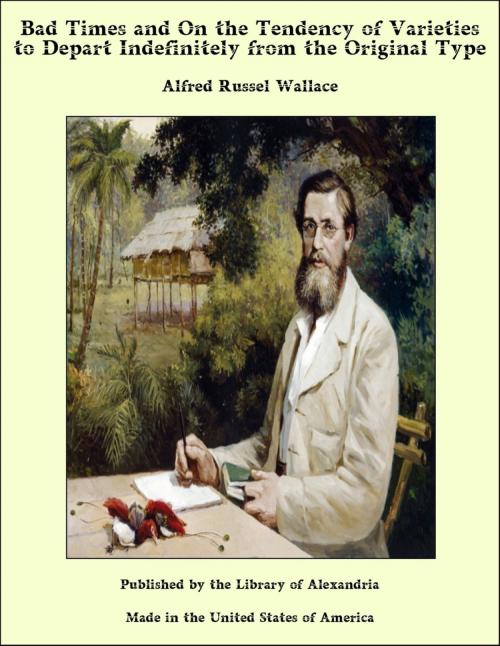Bad Times and On the Tendency of Varieties to Depart Indefinitely from the Original Type
Nonfiction, Religion & Spirituality, New Age, History, Fiction & Literature| Author: | Alfred Russel Wallace | ISBN: | 9781465610782 |
| Publisher: | Library of Alexandria | Publication: | March 8, 2015 |
| Imprint: | Language: | English |
| Author: | Alfred Russel Wallace |
| ISBN: | 9781465610782 |
| Publisher: | Library of Alexandria |
| Publication: | March 8, 2015 |
| Imprint: | |
| Language: | English |
The present Depression of Trade is remarkable, not so much for its intensity or for its extent—in both of which respects it has been equalled or surpassed on previous occasions, but for its persistence during the long period of eleven years. The late Professor Fawcett, in his Free Trade and Protection (p. 151), says: “The industrial depression is generally thought to have commenced in the closing months of 1874;” and during every succeeding year it has continued to be felt with more or less severity, and its remarkable persistence has been commented on by politicians and public writers. Usually a period of depression is quickly followed by one of comparative prosperity. Such a reaction has been again and again predicted in this case; but up to the present time there are no satisfactory indications that the evil days are passing away. It is evident, therefore, that we are suffering in an altogether exceptional manner, that the disease of the social organism is due to causes or combinations of causes which have not been in action on former occasions, and that the remedial agencies which have been effective on former occasions of depression have now failed us. We thus find ourselves confronted with a problem of vital importance to our well-being as a nation. We are called upon to explain why it is that, notwithstanding the exceptional advantages we possess, in an ever-increasing command over the more recondite powers of nature, an ever-increasing use of labour-saving machinery, a body of labourers whose industry and skill are proverbial, and far more complete and perfect communication with the whole world than was possessed by any previous generation—notwithstanding all these favourable conditions, which would seem to render prosperity certain, we yet find trade crippled and labour paralysed, goods of all kinds selling at unremunerative prices, yet the masses too poor to buy, and universal complaints of diminished profits and restricted markets. So long as these questions are not fully and completely answered, so long as a remedy is not found for the widespread and persistent evil which afflicts the mass of our people, our whole system of social economy, even our civilisation itself, must be accounted to be failures. It will undoubtedly be admitted that a system of society under which willing hands cannot find profitable work, and countless shops and warehouses overflowing with every necessary, comfort, and luxury, mock the longing eyes of insufficiently-clad and half-starved millions, is neither a sound nor a safe one. We may therefore expect to find that the problem of trade-depression is fundamentally the same as that of the persistence of widespread poverty and pauperism notwithstanding our rapid and continuous growth in wealth; and if this be so, its solution will assuredly furnish us with some important principles to direct the course of future legislation. The main points of a sound political programme may be one of the important results of a successful investigation into the causes which have brought about the present depression of trade.
The present Depression of Trade is remarkable, not so much for its intensity or for its extent—in both of which respects it has been equalled or surpassed on previous occasions, but for its persistence during the long period of eleven years. The late Professor Fawcett, in his Free Trade and Protection (p. 151), says: “The industrial depression is generally thought to have commenced in the closing months of 1874;” and during every succeeding year it has continued to be felt with more or less severity, and its remarkable persistence has been commented on by politicians and public writers. Usually a period of depression is quickly followed by one of comparative prosperity. Such a reaction has been again and again predicted in this case; but up to the present time there are no satisfactory indications that the evil days are passing away. It is evident, therefore, that we are suffering in an altogether exceptional manner, that the disease of the social organism is due to causes or combinations of causes which have not been in action on former occasions, and that the remedial agencies which have been effective on former occasions of depression have now failed us. We thus find ourselves confronted with a problem of vital importance to our well-being as a nation. We are called upon to explain why it is that, notwithstanding the exceptional advantages we possess, in an ever-increasing command over the more recondite powers of nature, an ever-increasing use of labour-saving machinery, a body of labourers whose industry and skill are proverbial, and far more complete and perfect communication with the whole world than was possessed by any previous generation—notwithstanding all these favourable conditions, which would seem to render prosperity certain, we yet find trade crippled and labour paralysed, goods of all kinds selling at unremunerative prices, yet the masses too poor to buy, and universal complaints of diminished profits and restricted markets. So long as these questions are not fully and completely answered, so long as a remedy is not found for the widespread and persistent evil which afflicts the mass of our people, our whole system of social economy, even our civilisation itself, must be accounted to be failures. It will undoubtedly be admitted that a system of society under which willing hands cannot find profitable work, and countless shops and warehouses overflowing with every necessary, comfort, and luxury, mock the longing eyes of insufficiently-clad and half-starved millions, is neither a sound nor a safe one. We may therefore expect to find that the problem of trade-depression is fundamentally the same as that of the persistence of widespread poverty and pauperism notwithstanding our rapid and continuous growth in wealth; and if this be so, its solution will assuredly furnish us with some important principles to direct the course of future legislation. The main points of a sound political programme may be one of the important results of a successful investigation into the causes which have brought about the present depression of trade.















